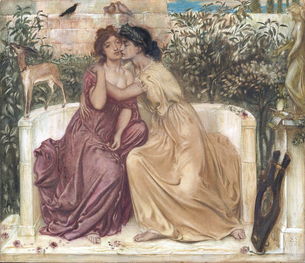Daniel Torres (he/him)Sappho (also occasionally spelled Psappho or Sapphus) is recognized as one of the most influential lyrical poets of both her period and all time, having been referred to as “the tenth Muse” by Plato himself. It’s well known that she is often portrayed as one of history’s most iconic lesbian figures. The term “lesbian” itself is a derivative of the name of her birth island, Lesbos, just as the adjective “sapphic” is a direct play on her name.  The painting “Sappho and Erina in the Garden Mytelene” by Simeon Solomon depicts the two provocatively embraced women surrounded by a beautiful scene of nature. Photo courtesy of Wikimedia Commons. The painting “Sappho and Erina in the Garden Mytelene” by Simeon Solomon depicts the two provocatively embraced women surrounded by a beautiful scene of nature. Photo courtesy of Wikimedia Commons. Historians have long contested her sexual orientation, however, and her having been born around 615 B.C certainly has made enlightening the situation complicated. So, what is the definitive conclusion? Was Sappho the hedonistic, sensual, (and potentially over-sexualized) lesbian that some historians have painted her out to be? Or did the naive, queer-blind historians actually get it right for once in assuming Sappho’s emotional poems were simply about a “good friend?” The short answer: we don’t know for sure. The long answer: it’s complicated--let’s get into it. Here’s what we know:
Glittering-Minded, Deathless Aphrodite by Sappho Glittering-Minded deathless Aphrodite, I beg you, Zeus’s daughter, weaver of snares, Don’t shatter my heart with fierce Pain, goddess, But come now, if ever before You heard my voice, far off, and listened, And left your father’s golden house, And came, Yoking your chariot. Lovely the swift Sparrows that brought you over black earth A whirring of wings through mid-air Down the sky. They came. And you, sacred one, Smiling with deathless face, asking What now, while I suffer: why now I cry out to you, again: What now I desire above all in my Mad heart. ’Whom now, shall I persuade To admit you again to her love, Sappho, who wrongs you now? If she runs now she’ll follow later, If she refuses gifts she’ll give them. If she loves not, now, she’ll soon Love against her will.’ Come to me now, then, free me From aching care, and win me All my heart longs to win. You, Be my friend.
0 Comments
Leave a Reply. |
Categories |
Search by typing & pressing enter
